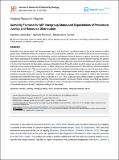Files in this item
Authority fairness for all? Intergroup status and expectations of procedural justice and resource distribution
Item metadata
| dc.contributor.author | Urbanska, Karolina | |
| dc.contributor.author | Pehrson, Samuel | |
| dc.contributor.author | Turner, Rhiannon | |
| dc.date.accessioned | 2019-10-16T09:30:02Z | |
| dc.date.available | 2019-10-16T09:30:02Z | |
| dc.date.issued | 2019-10-14 | |
| dc.identifier | 259389450 | |
| dc.identifier | 9ac2edbc-7786-4549-bd98-a00364764dfc | |
| dc.identifier | 85074972331 | |
| dc.identifier | 000514932600004 | |
| dc.identifier.citation | Urbanska , K , Pehrson , S & Turner , R 2019 , ' Authority fairness for all? Intergroup status and expectations of procedural justice and resource distribution ' , Journal of Social and Political Psychology , vol. 7 , no. 2 , pp. 2195-3325 . https://doi.org/10.5964/jspp.v7i2.974 | en |
| dc.identifier.issn | 2195-3325 | |
| dc.identifier.other | ORCID: /0000-0002-9259-6408/work/63381073 | |
| dc.identifier.uri | https://hdl.handle.net/10023/18683 | |
| dc.description | This research was supported by doctoral funding from the Department for Employment and Learning, Northern Ireland and carried out while the first author was at Queen’s University Belfast. The third study was supported by the university research funds of the third author. | en |
| dc.description.abstract | Authorities such as the police and the government play a vital function in maintaining order in the social systems that groups exist in. Relational models of procedural justice (PJ) state that fair treatment from authority affirms the social standing of those identifying with the authority, communicating inclusion and respect. Previous research suggests that social identity may also inform expectations of authority fairness. Focusing on intergroup context of authority decision-making, the present research tests a novel hypothesis whether intergroup social status may also inform expectations of authority fairness in terms of fair treatment and favourable outcomes. Operationalising PJ as the extent to which people are provided voice by authorities, three experimental studies showed no effect of intergroup status on expected PJ from authority. A sample weighed internal meta-analysis (N = 704) provided no support for the hypothesis that relative outgroup status shapes expectations of voice from authority (d = -.02). Intergroup status did, however, influence the extent to which people expected authorities to distribute resources favourably towards the outgroups. Lower status outgroups were expected to receive less favourable outcomes from authorities than equal status outgroups (d = -.23). Thus, outgroup status affects people’s judgements of the resources that outgroups deserve from authority. The present research is among the first to consider how intergroup relations may drive expectations of how authorities are to act towards other social groups. Implications for wielding authority and the role of perceived intergroup threat in intergroup settings are discussed. | |
| dc.format.extent | 642718 | |
| dc.language.iso | eng | |
| dc.relation.ispartof | Journal of Social and Political Psychology | en |
| dc.subject | Fairness | en |
| dc.subject | Authority | en |
| dc.subject | Intergroup status | en |
| dc.subject | Voice | en |
| dc.subject | Procedural justice | en |
| dc.subject | Intergroup relations | en |
| dc.subject | Brexit | en |
| dc.subject | BF Psychology | en |
| dc.subject | DAS | en |
| dc.subject.lcc | BF | en |
| dc.title | Authority fairness for all? Intergroup status and expectations of procedural justice and resource distribution | en |
| dc.type | Journal article | en |
| dc.contributor.institution | University of St Andrews. School of Psychology and Neuroscience | en |
| dc.identifier.doi | 10.5964/jspp.v7i2.974 | |
| dc.description.status | Peer reviewed | en |
| dc.date.embargoedUntil | 2019-10-14 |
This item appears in the following Collection(s)
Items in the St Andrews Research Repository are protected by copyright, with all rights reserved, unless otherwise indicated.

